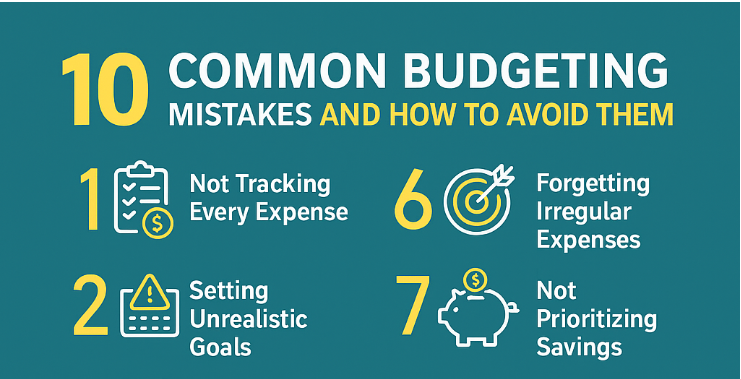Creating a budget is a key step toward financial independence, but even with the best intentions, many people fall into common traps that derail their progress. Budgeting is not just about tracking spending—it’s about creating a plan that is realistic, adaptable, and aligned with your goals. In this article, we explore the most frequent budgeting mistakes and how to overcome them for long-term success.
1. Not Tracking Every Expense
One of the biggest mistakes is failing to track every single expense. Small purchases, like daily coffee or quick lunches, might seem insignificant but can add up quickly. Without accurate tracking, you won’t know where your money is actually going, making it harder to control spending. Use budgeting apps or spreadsheets to record every transaction, no matter how small.
2. Setting Unrealistic Goals
It’s great to be ambitious, but setting goals that are too aggressive can backfire. If you plan to save half your income but only earn just enough to cover your bills, you’ll feel defeated quickly. Start with achievable goals and gradually increase your savings or debt payments as your financial situation improves.
3. Forgetting Irregular Expenses
Many people forget to include irregular or annual expenses like insurance premiums, holiday gifts, car maintenance, or property taxes. These can throw off your budget if you’re not prepared. Estimate these costs and divide them into monthly contributions so you’re ready when they arise.
4. Failing to Adjust Your Budget
Your budget should be a living document. If your income changes or unexpected expenses come up, you need to revise your plan. Many people create a budget once and never touch it again, leading to frustration and failure. Review your budget at least monthly to make sure it reflects your current reality.
5. Not Prioritizing Savings
Some people wait until the end of the month to save whatever is left. Unfortunately, there’s often nothing left. Treat savings like a fixed expense—pay yourself first by automating transfers to a savings or investment account as soon as you get paid. Even small amounts saved regularly can grow significantly over time.
6. Overcomplicating the Budget
A complicated budget with too many categories or complex spreadsheets can be overwhelming and discouraging. Simplicity is key. Focus on major categories like housing, food, transportation, savings, and discretionary spending. As you get more comfortable, you can fine-tune your system.
7. Ignoring Lifestyle Inflation
As your income grows, it’s tempting to upgrade your lifestyle immediately. While some upgrades are reasonable, ignoring lifestyle inflation entirely can prevent you from increasing your savings rate. Instead of spending more, use raises or bonuses to boost your financial goals.
8. Using Credit Cards to Fill Gaps
If your budget doesn’t balance and you rely on credit cards to make up the difference, it’s time to reevaluate your expenses. Using debt to cover regular costs is a sign that your spending is outpacing your income. Consider cutting non-essentials or finding ways to increase your income.
9. Forgetting to Budget for Fun
A strict budget with no room for entertainment or treats is difficult to stick with. Depriving yourself can lead to burnout or splurging. Allocate a small percentage of your income for guilt-free fun so you can enjoy life while still meeting your financial goals.
10. Not Reviewing Your Progress
Budgeting isn’t just about setting numbers—it’s about progress. If you don’t regularly review your performance, you won’t know if you’re getting closer to your goals. Set a monthly budget review session to celebrate wins, adjust plans, and stay on track.
Final Thoughts: Budget Smarter, Not Harder
Avoiding these common budgeting mistakes can make a huge difference in your financial journey. A well-maintained budget gives you control over your money, reduces stress, and brings you closer to your financial goals. Be patient, stay consistent, and don’t be afraid to adapt your plan as your life changes. With the right approach, budgeting becomes a tool for freedom—not restriction
